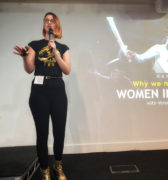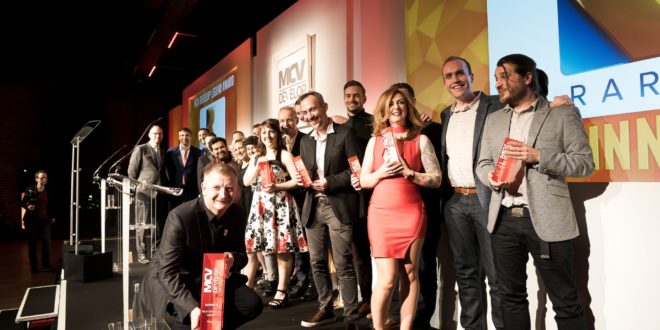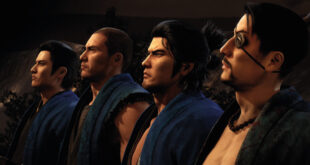The recent MCV/DEVELOP Awards brought together the whole of the UK games industry in a way that we’ve never attempted before. It now seems a world away, but it was actually only a few weeks ago that hundreds of us could still gather to celebrate the year’s achievements.
Combining the MCV and Develop Awards was always going to be tricky, we may be one industry but there’s an incredible variety of skills within it to recognise. But it also provided an opportunity for us to rethink why we gave out awards, who to, and what for.
The Develop Legend award has had numerous prestigious recipients: Shuhei Yoshida, Tim Sweeney, Mark Cerny, Hideo Kojima, David Braben and many, many more. However, we thought that the award should encompass teams as well as individuals, teams which are made up of the diverse talents required to bring any game to players today.
And when we started to think about teams that have achieved brilliant things at the highest level, both historically and in recent years, it was Rare’s name that came up, from our own team, from members of our Grand Jury and from others we spoke to.
GUARDIAN ANGEL

Among Rare’s supporters is The Guardian’s Keith Stuart, who picked Rare out as one of the most memorable of the “over 200 development studios” he’s visited over a quarter of a century of games journalism. So we invited him along to the awards ceremony to speak about this incredible developer.
“I have been playing their games for 35 years,” Stuart told 450 members of the assembled industry. “Throughout the 1980s and 1990s Rare worked extremely closely with Nintendo, on a series of smash hit titles from Battletoads to Banjo Kazooie, from Donkey Kong Country to GoldenEye and many others.
“During this period, and beyond, I believe this studio got closer than any other western developer to the design genius of Nintendo. Its projects have always shared that same philosophy of joy, light and innovation – where the games teach players how to play, and then let them loose in the world to express themselves.
“That’s a really crucial part. This company’s games have always left a space for the player to feel creative, to feel heard and seen. When you visit the studio you understand why that is. This is a company full of craftspeople – they obsess over every moment of play, every frame of animation, every note of music. This love of craft has been evident in every conversation I’ve ever had with people who’ve worked there.
“More recently, when this studio started out on projects for the Xbox One console, it could easily have taken a conventional route, revived a beloved franchise and worked within a safe, familiar genre.
“It didn’t. It made a massively multiplayer co-operative pirate simulation. I’ve been playing games for 35 years, and I thought I’d seen it all. But watching my sons play Sea of Thieves with their friends, all of them helpless with laughter as they accidentally drop another treasure chest in the sea, or get drunk on grog and throw up all over their ship, has reminded me of the supreme pleasure of video games.
“Unlike TV, unlike film, this medium allows us to forge our own paths and tell our own stories. And if there’s one studio in the world that really understands this unique quality, it is Rare.”
At that point, a horde of Rare employees rushed up on stage to receive their award. Obviously we’d have loved to have presented it to all 200+ employees in person, but that would have been tricky. Still, having a crowd of diverse talent on the stage, and a raft of awards representing the company’s various smash-hit games over the years, was in keeping with our new vision for a Legend award that gives credit to all.
RARE DECLARES

Later on we caught up with some of Rare’s staff who came up to receive those awards on the night, to ask them what they think makes a ‘Rare game’, the reasons behind the studios continued success as well as what they like about working for one of the UK’s longest-standing developers.
Simon Prodger, director of audience and brand, has a nice take on the Rare difference: “Rare makes the kind of games the world doesn’t already have. Rare games have a sense of magic about them, a distinctive creative spark and a determination to do things in their own way that makes them so delightful and original.”
That originality is also key to Veronica Heath, Rare’s talent ambassador: “I honestly think you can’t compare Rare’s games to anything else – we’ve always aimed to be different, memorable and unmistakably fun.”
Louise O’Connor, executive producer on upcoming title Everwild, tells us: “You know you’re playing a Rare game when you laugh out loud at something unexpected, or when you’ve done something that you can’t wait to share with your friends… Rare games are about filling up your heart and making you smile. I think the team puts huge effort into trying to give our players these moments and long-lasting memories.”
Long-term industry watchers often view Rare across three different periods including the early Spectrum years under the Ultimate Play the Game moniker, its many years working with Nintendo, and since 2002 with Microsoft, across the Xbox, Xbox 360 and Xbox One.

There are too many important games to mention, but what is notable is that Rare zipped from genre to genre during all of those eras. Never settling in any one niche, but instead making platformers, first person shooters, adventure games, racing games, motion-controlled titles and many titles that defy any such easy classification.
“I think the team and the studio are always looking for a new challenge, both creatively and technically,” O’Connor explains. ”We love being different and I think our success comes from a team of people who are driven to truly create new experiences. It comes down to us being brave, doing things a bit different and having the freedom and space to be creative – this is how projects like Everwild have come to fruition!”
“For me it would be Rare’s ability to continually reinvent itself as a studio,” concurs Prodger. “Rare has never sat back and taken the easy option. Instead it has always looked to evolve, grow and do new things in a way that keeps its games feeling so fresh and original. It takes a special team and culture to do this, creating an environment where people feel empowered to take creative risks.”
SEA OF DREAMS

With such a storied history, though, is there then a pressure on the team to deliver?
“It’s not a pressure to live up to a name – it’s only a name after all,” points out O’Connor. “Rare is much more than that – it’s the people, the creators of these worlds, this team. I think we have to live up to giving this team the right opportunities and support they need to do amazing things. It’s about us continuing to build the right inclusive culture, so we can build amazing games – that’s how you become Rare.”
“Everyone has their own experience and memories of our games, whether that’s from our older titles, discovering Sea of Thieves or joining the hype over Everwild – that’s really special to us. We want to continue to bring these memorable experiences to players each and every time, which as you can imagine comes with its own set of challenges!” Heath explains.
Prodger adds: “Yes, there’s a determination across the team to make our games as good as they can be, and for them to have the level of impact they deserve.
“As a first-party Xbox studio we have the chance to make games that positively impact the lives of millions of people. That’s an opportunity we’re all determined to take.”
And presently there are three opportunities that the studio is looking to deliver on.

“In Sea of Thieves we have a growing service that’s just entered its third year in the market and is as big as ever. We’re working with a partner studio to bring Battletoads to a whole new generation of players. And last but not least, with Everwild we get the chance to bring Rare’s next new IP to the world. Working on one of these titles would be a career highlight, getting to work on all three of them at the same time is just mind-blowing!” exclaims Prodger.
“My favourite thing about working at Rare is that every day I get up, I go into the office, and I know it will be a completely different day to yesterday,” O’Connor tells us. ”I love that we grow and evolve as developers every day – I love seeing the team create something new, I love playing something that feels special, or seeing a character that I can fall in love with again, or a part of the world that is so beautiful, I just want to look at it and take it all in. Every day is new, every day is inspiring and every day, my heart fills up a little bit more.”
And Heath concurs that it really is a dream job: “For me, Rare is so close to my heart as a gamer and I never imagined I’d have the opportunity to work here. Step into the studio each day and you see why Rare’s games are made with so much love, fun and dedication. Every day is about achieving something, helping each other and growing as teams and individuals. We live and breathe that in our studio’s culture. I really haven’t experienced that anywhere else in my working career.”
With the studio having succeeded, critically and commercially, in bringing gamers together in its social-centric pirate simulator. It looks to be continuing on that core idea of social gaming in Everwild. With the learnings from Sea of Thieves, its first persistent online game, to build upon, the title is set for truly huge things.

 MCV/DEVELOP News, events, research and jobs from the games industry
MCV/DEVELOP News, events, research and jobs from the games industry




